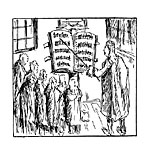
Is the “Natural Law” Concept Obsolete?
WHY IT FAILS TO RESONATE WITH POSTMODERN MAN
As appeals to Christian moral tradition have lost their efficacy in the culture wars, many conservatives hope that the natural law could be used as a Trojan horse to smuggle Christian moral precepts into the secular sphere. The difficulty is that the success of the Trojan-horse gambit relies on the presumption that the horse appears desirable to those whom it is meant to deceive. Odysseus went to a great deal of trouble to ensure that the Trojans were under the impression that the horse was sacred to Athena, and that victory was assured to whomever had it under their control. The problem with natural-law theory as it appears in the modern political sphere is that it is eminently convincing to those who already believe in Christian virtue, but is alien and irrelevant to everyone else.
The Law Graven on the Heart
Over the past 2,500 years the concept of the natural law has substantially developed. It is derived, indirectly, from the Greek thinkers who proposed a theory of natural justice in order to try to find a universal good in the face of massive regional discrepancies in law and custom. The ancient pagans, lacking a definitive revelation like that of the Jews, worked to understand good and evil on the basis of their observations of nature, both the natural world and the nature of the human person. St. Paul acknowledges this when he says that there are pagans “who never heard of the Law but are led by reason to do what the Law commands, may not actually ‘possess’ the Law, but they can be said to ‘be’ the Law. They can point to the substance of the Law engraved on their hearts — they can call a witness, that is, their own conscience” (Rom. 2:14-15). This verse was the foundation for the entrance of natural-law theory into Christian thought.
The basic idea behind the natural law as it emerged in Roman thought was that human beings have a particular nature, and that if this nature were properly observed and described, then it would be possible to come to a series of ethical techniques by which human beings could become happy. Just as certain conditions were auspicious for the growing of wheat or the raising of cattle, certain interior conditions might best serve the needs of the human soul. Ethics, therefore, was a sort of counterpart to medicine: the latter was to describe a regimen and standard of health that would serve the body, whereas ethics would perform the same task for the soul. Scientists and ethicists were both supposed to study the nature of the human person in order to describe the style of life that would best serve his well-being.
As the notion of the natural law was dovetailed into Christian doctrine, it became obvious that the nature of man was a direct product of the creative intention of God. The natural law was therefore situated in a position between revealed law and human law. It was accessible to all human beings of good will on the basis of reason, it was universal across cultural boundaries, and it could never be completely effaced from the human heart.
You May Also Enjoy
As the culture wars have made clear, evangelicals have far more in common with Catholics than with secularists and neo-pagans.
Last year, the NOR came under attack. Who was responsible remains a mystery, but truth be told, we’ve yanked a lot of chains over the years.
How can one disobey God's laws with impunity, redefine rights at will, call sin a virtue, regard self-interest as "conscience," and yet "hope" to be saved by God's mercy?

